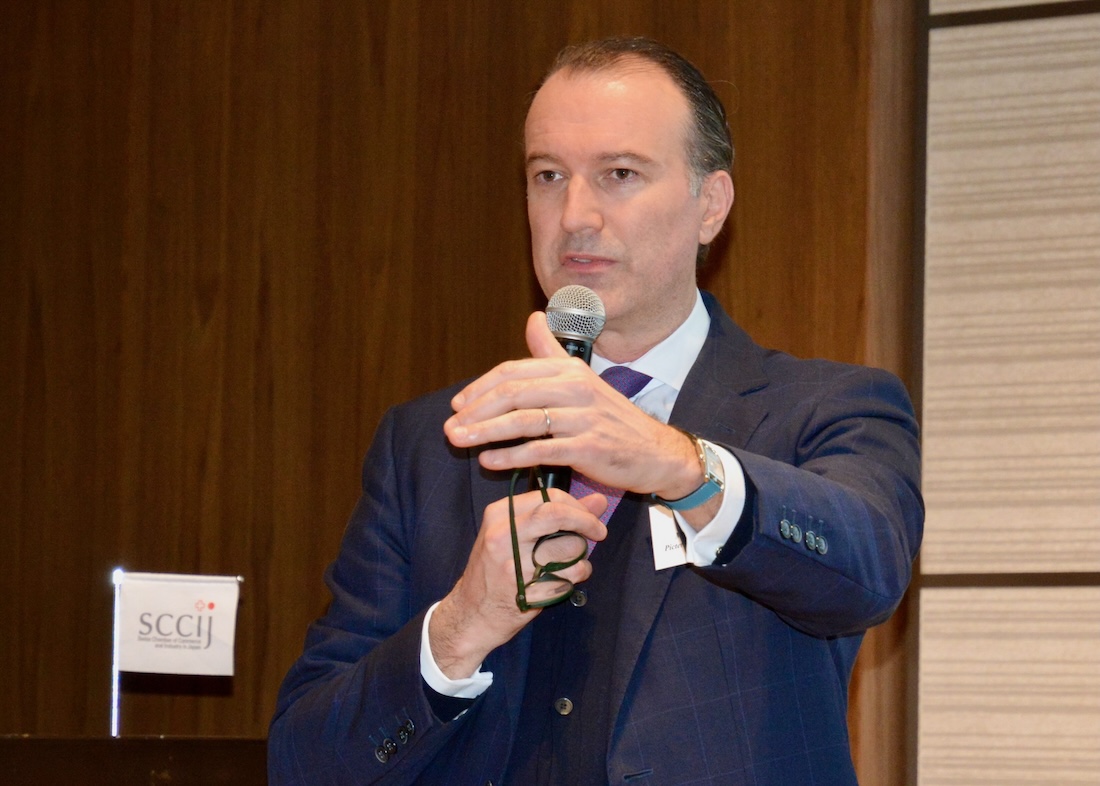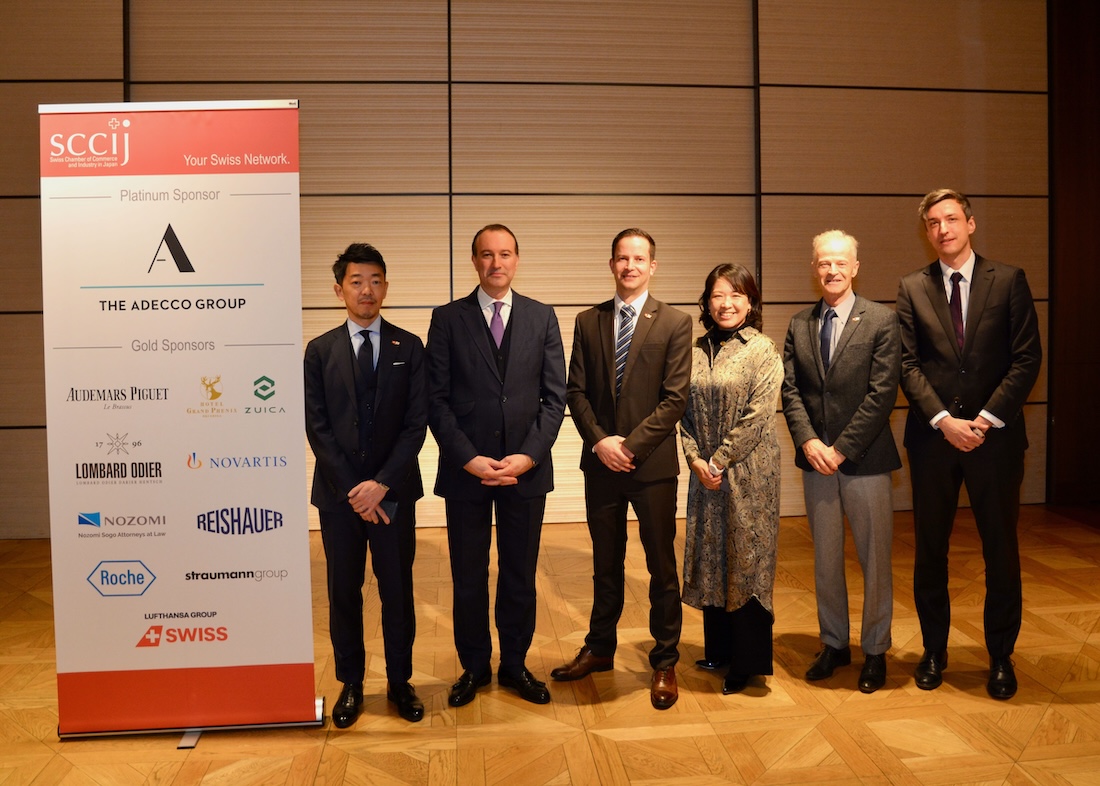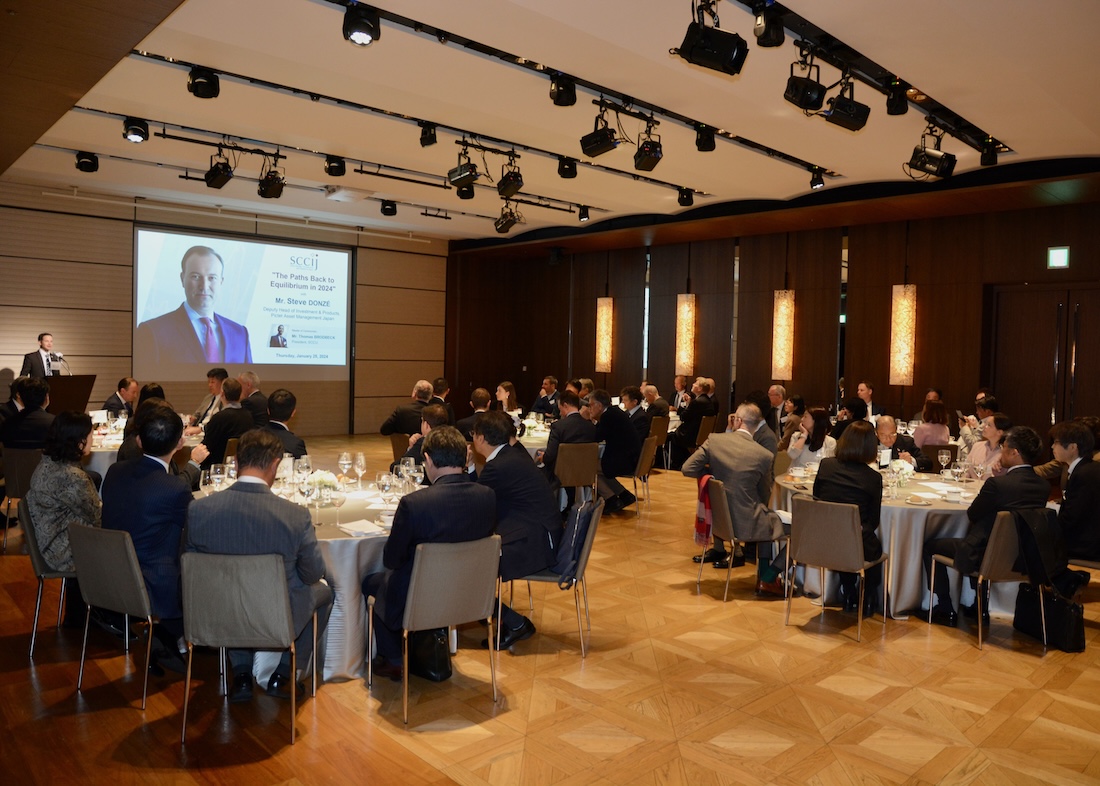Tokyo (SCCIJ) – At the January Luncheon, with more than 50 members and guests attending, Mr. Steve Donzé, Deputy Head of Investment, Pictet Asset Management Japan, explained the investment outlook of the largest European asset manager in Japan. We document his talk in Q&A form.

SCCIJ January Luncheon Speaker Steve Donzé of Pictet Asset Management Japan.
Mr. Donzé, when you talk about equilibrium, what do you mean?
Mr. Steve Donzé: An economy is in equilibrium when it grows at potential, inflation is at target, and unemployment is at its long-term natural rate. Four years ago, the pandemic struck and sent economies out of balance, with Western economies experiencing an inflationary boom, China undergoing a deflationary bust, while Japan stood in between. Today, Japan and the US are closest to equilibrium, while the Eurozone and China are farthest away.
You are using a clock for your asset management decisions. Could you explain this interesting approach?
S. Donzé: As the grandson of a Swiss watchmaker, good investment rhymes with good timekeeping! We map countries on our Swiss clock as activity, inflation, and policy data points come in, and derive overall asset mix and risk consumption. The clock is subdivided into six distinct cycle stages, indicative of where major economies stand in their cycles, from cycle trough to cycle peak and back again. If we get the time right, we get the portfolio right, not all the time, but most of the time.
And where are we on your Swiss macroeconomic clock?
S. Donzé: The global cycle is out of sync across the major regions: 10 o’clock in Japan (late cycle), 2 o’clock in the US (slowdown), 4 o’clock in the UK and Eurozone (downturn), 5 o’clock in China and the rest of the emerging markets (cycle trough). It is unseen that major economies spread over 7 hours, but this dyssynchronization is welcome as it is a source of geographical diversification benefits.

Members and advisors of the SCCIJ Executive Committee with January Luncheon Speaker Steve Donzé of Pictet Asset Management Japan.
Why do you put Japan at 10 o’clock?
S. Donzé: Japan still reads late cycle because it had a late Covid exit, and policymakers kept their foot on the stimulus gas pedal to escape from decades of stagnation. Japan is set to cool towards noon this year with modest policy normalization, most notably the removal of negative policy rates this spring. Currently, we keep favoring Japanese equities. Looking back, a Japan 50/50 portfolio (50% local bonds/50% local equities) gained 19% in real terms (net of inflation) in the four years since the start of the pandemic, a much better performance than a US classic portfolio with a gain of only 6%.
From a Japanese retail investor’s perspective, what investment strategy does seem appropriate?
S. Donzé: Japan stands out as government bond yields are slightly higher than cash rates, and equity earnings yields are a lot higher than bond yields. This situation creates a strong incentive for domestic investors, who have traditionally been heavily allocated to cash, to move into riskier assets. More than 50% of the financial assets of households are held in cash. That’s ¥1,100 trillion in cash, earning a negative real return. That’s almost 2 times the GDP and 1 time Japan’s equity market capitalization. Of course, equity risk aversion persists, but equities mean inflation protection today, just as cash meant deflation protection for so long.
The Nikkei 225 is approaching the old record high from more than 34 years ago. What are the driving forces behind this rise?
S. Donzé: Besides the return of inflation which makes holding cash unattractive, there are the regional reallocation of capital flows and manufacturing base looking for a safer home, ongoing corporate governance reforms, including the Tokyo Stock Exchange pushing for corporations to return capital to shareholders, and new special investment accounts (NISA) incentivizing savers to make tax-deducted financial investments. There is a broad range of tailwinds at play.

The SCCIJ January Luncheon at the Grand Hyatt Hotel was fully booked.
How attractive are Japanese equities for foreign investors who have long been absent from Japan?
S. Donzé: Renewed foreign investor interest is multifaceted. The yen is at the cheapest level ever. Interest rates in Japan will rise, but much less than in Europe and the US. The Bank of Japan is likely to thread the needle carefully, not to reverse early success. We foresee a shallow tightening cycle that could lift policy rates to 0.5% in 3- or 4-years’ time, leaving real rates negative. Also, listed Japanese companies’ balance sheets are over-capitalized, 50% of Topix firms have a net cash position, which raises the prospects of continued buybacks. All this looks like a “once in a generation” opportunity to invest in Japan.
What about the geopolitical dangers for risk assets like equities?
S. Donzé: Today’s investment landscape is a geopolitical minefield. There are structural drivers such as the end of US unipolarity, the rise of China as a challenging power, and slower globalization, if not deglobalization. For economies and markets, it translates into slower growth and higher inflation. Two of the most impactful issues are the US-China strategic competition and the US presidential election. In addition to diversification, one asset to protect oneself against sudden disturbances is gold, a time-tested safe haven.
About the speaker
Mr. Steve Donzé joined Pictet Asset Management in 2007. Since 2022, he has been Deputy Head of Investment at Pictet Asset Management Japan. He manages a range of publicly traded funds, including Pictet Quattro Fund, one of Japan’s largest multi-asset funds. Before Pictet, he held positions at the Swiss Bankers Association and the Swiss Ministry of Foreign Affairs. Mr. Donzé holds a PhD from the London School of Economics and a Master’s degree from the Graduate Institute of International Studies in Geneva.
Text and pictures: Martin Fritz for SCCIJ





























